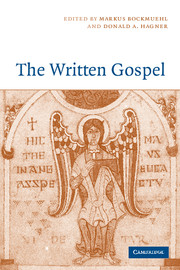Book contents
- Frontmatter
- Contents
- List of contributors
- List of abbreviations
- Introduction
- PART I BEFORE WRITING
- 1 ‘Gospel’ in Herodian Judaea
- 2 The gospel of Jesus
- 3 Q1 as oral tradition
- 4 Eye-witness memory and the writing of the Gospels
- PART II WRITING THE FOUR GOSPELS
- PART III AFTER WRITING
- Appendix: Graham Stanton's publications
- Bibliography
- Index of ancient sources
- Index of authors
4 - Eye-witness memory and the writing of the Gospels
Published online by Cambridge University Press: 07 December 2009
- Frontmatter
- Contents
- List of contributors
- List of abbreviations
- Introduction
- PART I BEFORE WRITING
- 1 ‘Gospel’ in Herodian Judaea
- 2 The gospel of Jesus
- 3 Q1 as oral tradition
- 4 Eye-witness memory and the writing of the Gospels
- PART II WRITING THE FOUR GOSPELS
- PART III AFTER WRITING
- Appendix: Graham Stanton's publications
- Bibliography
- Index of ancient sources
- Index of authors
Summary
For the last several decades, Graham Stanton has worked primarily in Gospels and Jesus research. Following in his footsteps, these reflections concentrate on how the ‘history of Jesus’, of which we have only fragmentary knowledge, is related to the four Gospels as the oldest narrative reports about him.
In studies of the Gospels, one often reads that they were not concerned to be ‘historical narratives’ (let alone ‘biographies’) but above all witnesses of faith and means of proclamation, so that questions of historicity completely miss their intention. As a result of this judgment, Protestant Synoptic exegesis since ca. 1920 followed by its Catholic counterpart since ca. 1960 suffered a certain loss of historical interest; the individual Synoptic texts were often questioned only about the theology of their author or their narrative strategy and historical studies were often discredited as ‘naïve historicism’. The one-sided flood of redaction-critical, linguistic, narrative and socio-rhetorical studies in recent decades has its source here. In reality, however, the Synoptic Gospels consciously intend to narrate a temporally removed event of the past, i.e., Jesus' unique history, which, of course, has fundamental significance for the present time of the evangelists and the communities addressed through them, indeed for all humanity, since what is narrated is already for Mark euangelion which wishes to convey saving faith in Jesus as Messiah and Son of God. The closing statement of John 20.31 basically applies to all four Gospels.
- Type
- Chapter
- Information
- The Written Gospel , pp. 70 - 96Publisher: Cambridge University PressPrint publication year: 2005
- 2
- Cited by



